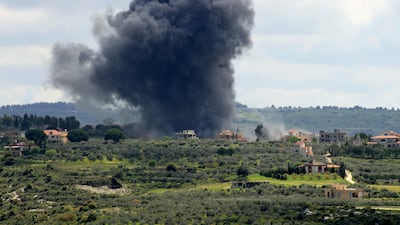Live updates: Follow the latest on Israel-Gaza
Hezbollah shot down an Israeli drone flying over Lebanon on Sunday as Israeli jets launched strikes deep within the country, in the Bekaa valley region.
A source close to Hezbollah earlier told AFP in the Baalbek region in eastern Lebanon that the strikes had targeted Janta and Sinfri in the Bekaa Valley.
Israel launched similar strikes against Hezbollah targets in the Bekaa Valley in February after the group said it had shot down another Israeli drone.
Hezbollah said it fired "dozens of Katyusha rockets" at two Israeli bases on Sunday "in response to the enemy's attacks on the Bekaa area". Katyusha rockets are named after Soviet rockets from WW2 but Hezbollah uses modern variants of the unguided weapon.
The militant group said the drone shot down on Sunday was a Hermes 900, according to a Telegram statement. It posted a video of the aircraft being targeted.
According to Janes, a British defence consultancy, each Hermes 900 costs up to $6.8 million. Israel has lost about three fixed-wing drones since fighting broke out on the border on October 8, a day after Hamas launched a huge raid into southern Israel, killing about 1,200 people.
Israel responded with bombardment and invasion of Gaza killing more than 33,000 Palestinians, leading to intervention by Hezbollah and, in Yemen, the Houthis who launched a blockade of the Red Sea. In Syria and Iraq, Iran-backed militias have also launched drone attacks towards Israel.
The Israeli army acknowledged that its drone was shot down. It also said Hezbollah air defence systems had been targeted in retaliation. Lebanon's state-run National News Agency (NNA) said the target of the Israeli strikes in Sifri was a "hangar".
Israel struck a military compound as well as three air defence compounds in the Bekaa Valley "in response to the shooting down of the Air Force aircraft last night", it said on X.
Hezbollah air defences
Hezbollah has access to shoulder-launched anti-aircraft missiles capable of shooting down very low-flying jets, drones and helicopters.
Last year, the Washington Institute for Near East Policy, a think tank, said Iran may have transferred more capable systems to the group, such as the Iranian 358 anti-aircraft missile, which has been used by Iraqi militias and the Houthis in Yemen, supplied by Iran.
Since the latest Hezbollah-Israel war began, there have been fears clashes could transform into a much larger conflict. Israel bombs southern Lebanon, and occasionally targets further north such as Baalbek, on a near-daily basis, while Hezbollah frequently fires rockets into Israel.
Israeli shelling has killed about 270 Hezbollah fighters and 50 civilians. In southern Lebanon, about 90,000 people have also been displaced, while more than 96,000 Israelis have been displaced from the country's northern border area.
A wider war would be far more destructive, analysts say, involving thousands of Israeli air strikes and up to 1,000 Hezbollah rocket and missile attacks per day.
The last war between Israel and Hezbollah in 2006, lasting little over one month, killed about 1,200 Lebanese, mostly civilians including around 250 Hezbollah members, while about 4,500 people were injured.
In Israel, 44 civilians were killed, nearly 1,300 were injured and 121 soldiers were killed in a short-lived invasion of southern Lebanon.
Analysts say neither side wants a repeat of such a conflict, but are nonetheless preparing for a major escalation. In December, Israeli War Cabinet member Benny Gantz warned, "if the world doesn’t get Hezbollah away from the border, Israel will do it."
Hezbollah leader Hassan Nasrallah said in a televised speech on Friday that his movement had not yet used its "main" weapons, and reiterated that Hezbollah would cease its attacks only when the war in Gaza ends.

